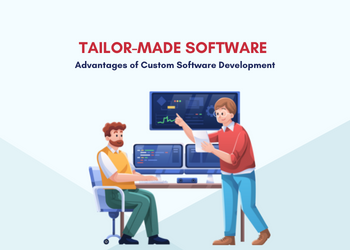Tailor Made Software – Advantages of Custom Software Development


Digital transformation and gaining a competitive advantage through software are now the norm for all businesses. Integrating new digital technology into all aspects of a company is essential to meet the ever-changing needs of the market and commercial sector. Implementing a custom software solution offers numerous benefits, including increased automation, shorter delivery times, higher employee engagement, and faster value delivery to the business.
What exactly is Tailor-Made Software?
Tailored software (bespoke software or customized software) is designed specifically for a single person, company, or organization. Because the application was created specifically for your company, there are no limitations to what it can accomplish.
Additional features and upgrades may be introduced throughout the product’s lifecycle to meet changing company demands.
The degree to which custom software solutions are customized is also considered when categorizing them.
Fully customized: This type of solution refers to software created from the ground up. Using pre-existing libraries is usually far more practical than creating your own from scratch. Because of the uniqueness of the architecture, only a few software projects require a complete rewrite.
Semi-custom: Most customized applications are created using the semi-custom method, which is by far the most common. This solution leverages existing software to save time and avoid starting from scratch. The development team can focus on other, more critical project areas by utilizing pre-developed libraries.
Custom software systems: These solutions are used by some businesses that rely on software provided by other organizations with similar business requirements. Instead of starting from scratch, this software development team uses an existing application.
Custom Software vs Off-the-Shelf Software
How does tailor-made software differ from pre-packaged software in terms of functionality?
Suppose you want something that is immediately usable and capable of handling multiple user profiles. In that case, off-the-shelf software is the tool for you.
It could be beneficial to small businesses. Due to their widespread use across industries, canned solutions are limited to performing broad tasks because they are pre-configured.
According to a different study, however, 80% of off-the-shelf software features were rarely or never used.
Modern technology can help to improve customer service, sales, and employee productivity. This technology can only save you so much time, and the cost is inversely proportional to the number of users in this approach.
The process may take longer than expected due to a lack of IT personnel to assist with product deployment and software development. Because this software is rarely updated, its usefulness deteriorates over time.
What distinguishes tailor-made software from ready-made software?
Framework: Ready-made solutions have a similar visual and structural design because they appeal to many buyers. The primary distinction between bespoke and off-the-shelf software is this. The main disadvantage of pre-built software is that it may not meet your company’s specific needs. Custom software development enables you to tailor the solution to your specific needs while increasing productivity.
Software Cost: Pre-built software is less expensive than designing an application from the ground up. This is because the cost of pre-built applications is spread across many businesses. In contrast, customized solutions are designed specifically for a single company. You almost always have to pay for future updates when you buy pre-built software. You will have to pay again if you want to make any changes to avoid owning an out-of-date product.
Updates: In the case of commercial software, you will usually have to pay for future updates. Unfortunately, such updates are limited, and you will have to pay multiple times over time if you do not want to end up with an outdated product. Customized software updates, on the other hand, are released based on your budget and needs.
The Primary Benefits of Using Custom-Made Software for Business
According to an Appian survey of Information Technology Decision Makers, 87% of IT leaders believe that developing custom software accelerates innovation in business technology. This is the primary reason businesses investigate the benefits of developing custom software.
Determining whether your company requires custom software can be difficult. We’ve compiled a list of the benefits of such software to help you make an informed decision.
Custom software streamlines the process of integrating your old and new systems.
Even if you only require a single new custom software system to address a specific issue in your business, the designs created specifically for you can interoperate with your existing systems. As a result, business processes may be improved and software issues avoided.
Customized software accounts for and accelerates growth.
As a business grows, so must its IT infrastructure. If your company is new and has no expansion plans, off-the-shelf software may suffice. On the other hand, as your business grows and requires support for changing business demands, this type of software may become a problem. Furthermore, as your company grows, software licensing costs may become prohibitively expensive. As a result, customized software development ensures that organizational growth is not stifled or limited by a software shortage.
Custom software is more dependable.
In several ways, as a business owner, you are linked to the developer of the products you buy. As a result, you have no input into pricing, user agreements, or terms and conditions. If, for example, the developer goes out of business or stops updating the software you use, your company’s operations may suffer until a replacement source is found. Once created, custom software is yours to use indefinitely and in any way, you see fit. Even if you factor in care costs and improvements, your worries will likely be significantly reduced.
Custom software boosts your team’s productivity and efficiency.
You can ensure that your program is intuitive by focusing on the most important features. Confusion and guessing are eliminated by simplifying the user experience and streamlining the data entry process. Previously time-consuming operations can now be completed in a fraction of the time by simplifying and automating the various aspects of a complex process.
You own the intellectual property (IP)
Commercial software is frequently licensed, which means it costs money. When it comes to custom software development, you have complete control over the code. The customized software solution strengthens your intellectual property portfolio and financial position. You’ll also have the opportunity to network with other industry leaders and develop marketing plans for your products. You have more control over how the program is used when you own the source code than when you buy a packaged version.
Gain an advantage over competitors
You may be able to differentiate your company’s services from those of your competitors by using customized software. Consider creating a self-service portal with a professional look and feel to enable self-service access to data and other services your customers would not otherwise have. Alternatively, you could focus your efforts internally by creating a continuing education platform that facilitates new employee training and knowledge exchange among more experienced employees.
It offers a fantastic long-term return on investment.
Be prepared to spend a lot of money upfront if you develop custom software. This is an investment for the long term. Because no new hardware or license is required, no additional fees or expenditures are associated with using an off-the-shelf solution. Despite their high initial costs, the advantages of custom software outweigh any disadvantages of commercial software. Custom software enables your team to perform more efficiently and effectively by implementing solutions tailored to your specific needs.
Finally, it was designed to meet your specific company’s needs, assist you in overcoming obstacles, and help you achieve specific business goals.
Improved security
Inherently insecure software is available on the open market. A popular software solution is not always safe due to its widespread use. Your company’s security may suffer if you rely solely on built-in solutions. When you add a new software solution to your current technological stack, you should consider the possibility of dependency issues.
Hackers frequently target commercial off-the-shelf goods due to documented vulnerabilities in publicly accessible APIs. The hacker gains an advantage by exploiting flaws in widely used software, allowing access to the data of tens of thousands of businesses. On the other hand, custom software may benefit from “security by obscurity” if a few people only use it within your organization.
One of the most important advantages of custom software development is its ability to stand out from generic alternatives. Your safety is significantly increased when you are unique.
Increase Scalability
Businesses must constantly adapt and develop to remain competitive. Most software is unsuitable for the majority of users. A pre-made solution may make carrying a heavy load difficult; however, tailor-made software can adapt to these changes.
A solution tailored to your company’s specific needs will evolve alongside it. When you buy off-the-shelf software, you are at the mercy of the developer from whom you purchased it. You can gain control by developing custom software.
You won’t have to rely on others to keep your software up to date or to maintain it for you. You could work with a development team in charge of maintaining and developing your solution as your company grows.
Which business sectors benefit the most from a customized software solution?
There are five types of tailored software from which businesses in various industries can benefit.
According to the findings of the Appian report, custom software creates an obvious advantage for a company operating in financial services (48%) or manufacturing (41%). They are closely followed by the telecommunications industry (39%) and the healthcare/pharmaceutical sector (38%).
Content Management Systems (CMS)
Companies can update their websites using a content management system. A good CMS allows users to add new posts, web pages, or images without needing a web developer. This type of custom software handles all of the necessary tasks.
Customer Relationship Management (CRM)
CRM software enables businesses to track customers, referrals, prospective clients, and vendors for their sales and marketing departments. This solution consolidates all customer information into a single repository, allowing you to systematize better and manage relationships. It also aids in the automation of standard processes as well as the monitoring of performance and productivity.
Enterprise Resource Planning System
ERP solutions can manage an enterprise’s daily operations, such as accounting, risk management, audit and compliance, procurement, supply chain operations, and project management. It consolidates existing business processes into a single customized system while minimizing unnecessary data replication.
Operations Management Software
Operations management software is designed to help organizations automate manufacturing capabilities or manage business processes. The primary goal of an operations management solution is to ensure that a company’s operations are practical and efficient.
Enterprise Software Solutions
Enterprise software helps businesses by improving business and management reporting tasks. This software can assist companies with online payment processing, interactive product catalogues, automated billing, and security.
In Conclusion
It is critical to evaluate the size and scalability of your company. Your long- and short-term goals, as well as your vision and business model, all influence your final decision. In the long run, the benefits of custom software outweigh development costs.
